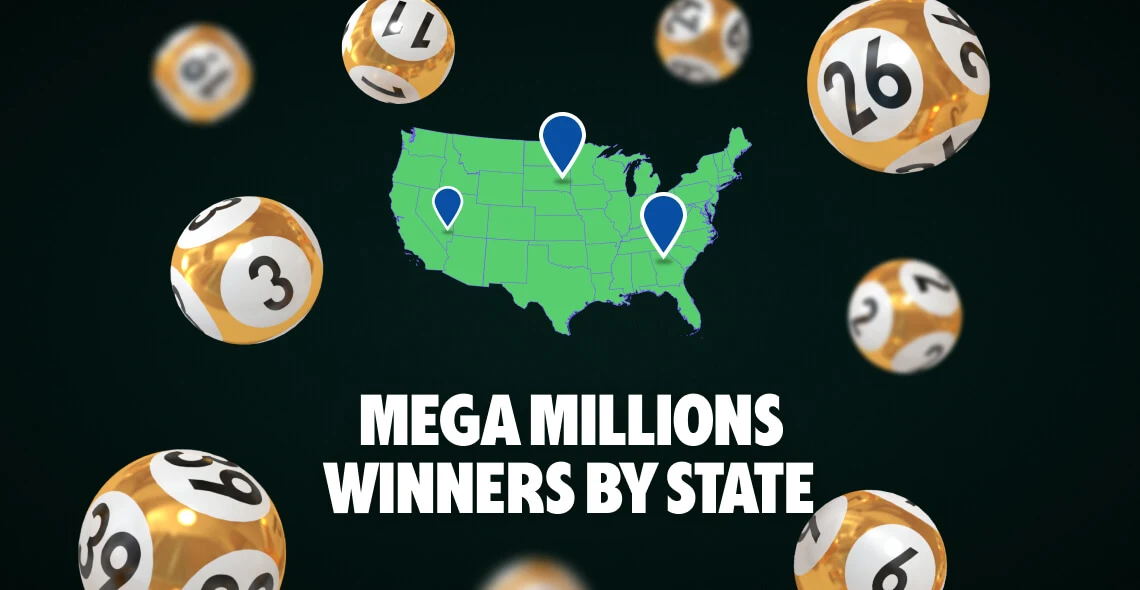List of Mega Millions Winners by State: Where the Luck Strikes Most
Written by Jackpot Staff
Updated: May 8, 2025

Have you ever wondered which states have produced the most Mega Millions jackpot winners? Or perhaps you're curious if your state has a lucky streak when it comes to hitting those life-changing prizes?
If you're a dedicated lottery player or just fascinated by the stories behind these massive wins, this comprehensive breakdown of Mega Millions winners by state reveals some surprising patterns and memorable jackpot moments.
The Mega Millions Winner Map: Which States Lead the Pack?
When it comes to Mega Millions success, not all states are created equal. Some have consistently produced winners, while others are still waiting for their first jackpot celebration.
Top 5 States with the Most Mega Millions Winners
1. New York: 43 jackpot wins - New York stands tall as the undisputed champion of Mega Millions wins. With 43 jackpots claimed, the Empire State has established itself as a lottery powerhouse. Notable wins include a $256 million prize in December 2024 and a share of a $687 million jackpot in 2018.
2. California: 35 jackpot wins - The Golden State comes in second with 35 jackpot wins, including the jaw-dropping $1.22 billion ticket sold in Cottonwood in December 2024 – the fifth-largest in Mega Millions history. California's massive population and extensive network of lottery retailers (about 11% of all U.S. lottery retailers) contribute to its impressive win count.
3. New Jersey: 24 jackpot wins - The Garden State has cultivated quite a collection of Mega Millions winners. One of its most memorable wins came in 2016 when the "Smith Family Lottery Pool" claimed a $429 million prize, highlighting how group play can lead to massive wins.
4. Ohio: 20 jackpot wins - Ohio rounds out the top tier with 20 jackpot wins. The Buckeye State has consistently produced winners since the early days of the game.
5. Michigan: 18 jackpot wins - Michigan has established itself as a lottery hotspot with 18 Mega Millions jackpots. The state has also been a pioneer in online lottery sales, which may contribute to its continued success.
Middle of the Pack: States with Moderate Success
Several states have established respectable win records:
- Georgia: 17 jackpot wins
- Illinois: 16 jackpot wins
- Texas: 15 jackpot wins
- Maryland: 12 jackpot wins
- Virginia: 11 jackpot wins
Still Waiting for Luck: States with No Mega Millions Jackpot Winners
Surprisingly, 19 states have yet to celebrate a Mega Millions jackpot winner. These include:
- Wyoming
- Mississippi
- North Dakota
- Montana
- Vermont
- Maine
- Alaska (does not participate in Mega Millions)
- Hawaii (does not participate in Mega Millions)
- Nevada (does not participate in Mega Millions)
- Utah (does not participate in Mega Millions)
- Alabama (does not participate in Mega Millions)
Many of these states joined the Mega Millions game later than others or have smaller populations, which may explain their jackpot drought. Some states don't participate in Mega Millions at all due to state laws prohibiting lottery games.
Record-Breaking Mega Millions Jackpots and Their Winners
The allure of Mega Millions lies in its potential for truly life-altering jackpots. Here are some of the most remarkable wins in the game's history:
The Biggest Mega Millions Jackpot Ever: $1.602 Billion (Florida, 2023)
In August 2023, a single ticket purchased in Florida claimed the largest Mega Millions jackpot in history: a staggering $1.602 billion. This win shattered previous records and captured national attention, proving that even states with fewer historical wins can produce monumental jackpots.
California's $1.22 Billion Cottonwood Win (2024)
California added to its impressive win count with a $1.22 billion jackpot in December 2024. Beyond making one lucky winner incredibly wealthy, this jackpot generated approximately $9 million for California's Common School Fund, demonstrating how these massive prizes benefit education.
Illinois' Recent $349 Million Jackpot (2025)
In March 2025, a group calling themselves "Blessed" won a $349 million Mega Millions jackpot in Cortland, Illinois. They opted for the lump-sum payment of $161.4 million rather than the annuity option, reflecting a common preference among modern lottery winners.
What Factors Influence Which States Have More Winners?
You might be wondering why some states consistently produce more winners than others. Several key factors come into play:
Population Size Matters
It's no coincidence that populous states like New York and California top the winner list. More residents mean more ticket purchases, which naturally leads to more winners. New York, with over 19 million residents, has more potential players than Wyoming with its population of less than 600,000.
When States Joined the Game
Mega Millions began in 1996 as "The Big Game" with just six founding states: Georgia, Illinois, Maryland, Michigan, Massachusetts, and Virginia. States that joined later have had less time to accumulate winners. By 2025, the game had expanded to 47 jurisdictions, including 45 states, Washington D.C., and the U.S. Virgin Islands.
Lottery Culture and Accessibility
Some states have stronger lottery cultures than others. States with more lottery retailers per capita, more aggressive marketing, or more convenient purchasing options (like online sales) tend to see higher participation rates and, consequently, more winners.
How Mega Millions Winners Impact Their States
When a state produces a Mega Millions winner, the effects ripple beyond just the lucky ticket holder.
Tax Revenue Boosts
States collect significant tax revenue from lottery winnings. For example, New York has some of the highest state taxes on lottery prizes, collecting up to 8.82% on top of federal taxes. This creates a windfall for state coffers whenever a major jackpot is won.
Retailer Bonuses
The stores that sell winning tickets often receive substantial bonuses. When the $349 million ticket was sold in Illinois in 2025, the retailer received a $500,000 bonus. These bonuses can transform small businesses overnight.
Education and Public Program Funding
Lottery proceeds support various state programs:
- California directs 35% of lottery profits to public education
- Texas allocates 27.1% of ticket sales to its Educational Enhancement Trust Fund
- Pennsylvania uses lottery income to fund programs for seniors
- Colorado invests lottery revenue in parks and outdoor recreation
Since Mega Millions launched, these contributions have totaled billions of dollars across participating states.
The Changing Face of Mega Millions Winners
The profile of Mega Millions winners has evolved significantly over the years.
The Trend Toward Anonymity
Recent winners increasingly choose anonymity when collecting their prizes. The "Blessed" group from Illinois and many other recent winners have used trusts or other legal entities to shield their identities. Currently, 17 states permit anonymous lottery claims, reflecting growing privacy concerns.
Group Play on the Rise
Lottery pools and group play arrangements have become increasingly common. The "Smith Family Lottery Pool" in New Jersey and workplace lottery pools across the country have claimed significant prizes, allowing friends, families, and colleagues to share both the cost of playing and the excitement of winning.
Digital Transformation
Online ticket sales are changing how people play Mega Millions. States like Michigan and New Jersey have seen a 200% increase in online lottery participation from 2020 to 2025. This shift may influence which states produce winners in the future, as tech-savvy populations gain easier access to tickets.
How to Improve Your Chances of Joining the Winner List
While Mega Millions remains a game of chance with astronomical odds (1 in 302 million for the jackpot), there are ways to play more strategically:
Consider Less Popular States
When traveling, you might consider purchasing tickets in states with fewer winners historically. While the odds of winning remain the same, if you do win, you might be less likely to share the prize with other winners from that drawing.
Play Consistently but Responsibly
Regular players who maintain a consistent budget have more opportunities to win over time. Set aside a fixed amount that you can afford to spend on tickets, and stick to it regardless of jackpot size.
Use Jackpot.com for Convenience
Enjoy a more convenient way to order your Mega Millions tickets online with Jackpot.com. Our platform makes it easy to play from anywhere in eligible states, ensures your tickets are safely stored, and automatically notifies you of any wins. Plus, you'll never miss a drawing or forget to check your numbers again!
What Happens If Your State Produces a Mega Millions Winner?
When someone wins Mega Millions in your state, it creates a buzz that extends beyond the winner themselves:
Media Attention and Local Pride
Local news outlets typically feature stories about the winning ticket and the retailer who sold it. This creates a sense of community excitement and pride, especially in states that haven't had many previous winners.
Increased Ticket Sales
A big win often triggers a surge in lottery ticket sales in that state, as the "lucky location" phenomenon leads players to believe lightning might strike twice. After California's $1.22 billion win, nearby retailers reported sales increases of up to 30%.
Economic Ripple Effects
Beyond the winner and the selling retailer, local economies often benefit from major jackpot wins. Winners frequently invest in their communities, start businesses, or make charitable donations that benefit their home states.
Will Your State Be Next?
The distribution of Mega Millions winners across states tells a fascinating story of luck, population dynamics, and the evolution of America's second-largest lottery game. While New York and California may lead in total wins, history has shown that life-changing jackpots can be won anywhere tickets are sold.
Whether your state is a lottery powerhouse or still waiting for its first big win, one thing remains certain: you can't win if you don't play. With jackpots regularly climbing into the hundreds of millions and occasionally breaking the billion-dollar barrier, Mega Millions continues to offer the dream of instant wealth to players across the nation.
So what are you waiting for? Your ticket could be the one that adds your state to the winner's list! Head to Jackpot.com today to secure your chance at the next Mega Millions drawing and start your own unforgettable lottery adventure. Who knows? You might just become the next headline in your state's Mega Millions success story!
Frequently Asked Questions
Q: Which state has won the most Mega Millions jackpots?
A: New York holds the record with 43 jackpot wins.
Q: Can I order Mega Millions tickets online?
A: Yes, in participating states, you can order Mega Millions tickets online through services like Jackpot.com.
Q: What are the odds of winning the Mega Millions jackpot?
A: The odds of winning the Mega Millions jackpot are approximately 1 in 290 million.
Q: Are Mega Millions winnings taxed?
A: Yes, lottery winnings are subject to federal and potentially state taxes. The exact amount depends on the win size and state laws.
Q: Which states don't participate in Mega Millions?
A: Alaska, Hawaii, Nevada, Utah, and Alabama do not participate in Mega Millions.
Q: What's the difference between lump sum and annuity?
A: Winners can choose a one-time lump sum payment (less than the advertised jackpot) or an annuity paid out over 30 years.

